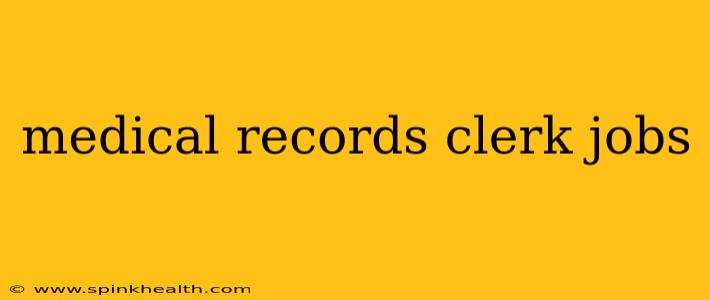The rhythmic tap-tap-tapping of keys, the hushed efficiency of a bustling medical office, the satisfying feeling of order restored – these are just some of the aspects that draw people to the rewarding career of a Medical Records Clerk. But what exactly does the job entail, and what's the path to landing one of these vital roles? Let's dive in and explore the world of medical records clerk jobs.
What Does a Medical Records Clerk Do?
Imagine yourself as the guardian of crucial medical information. That's essentially the role of a medical records clerk. You're the organized heart of a healthcare system, responsible for maintaining the accuracy, confidentiality, and accessibility of patient records. This involves a multifaceted job description encompassing tasks like:
- Maintaining Patient Records: This is the core function – meticulously organizing, filing, and retrieving physical and electronic patient charts, ensuring everything is up-to-date and easily accessible for doctors, nurses, and other healthcare professionals.
- Data Entry: You'll be entering patient data into electronic health records (EHR) systems, ensuring accuracy and adherence to HIPAA regulations (more on that later!). This often involves using specialized software and adhering to strict protocols.
- Record Requests: Responding to requests for medical records from patients, insurance companies, and other healthcare providers, ensuring proper authorization and adhering to strict confidentiality guidelines.
- Coding and Classification: Depending on the role and facility, you might assist with coding medical diagnoses and procedures using standardized classification systems like ICD-10.
- Quality Control: Regularly reviewing charts to ensure completeness, accuracy, and compliance with regulatory standards.
What Skills Are Needed to Be a Medical Records Clerk?
This isn't just about filing; it requires a unique blend of skills:
- Accuracy and Attention to Detail: A single misplaced comma can have significant consequences. Meticulous accuracy is paramount.
- Organizational Skills: Managing hundreds, even thousands, of patient records requires exceptional organizational skills.
- Computer Proficiency: Familiarity with EHR software and other relevant computer programs is essential.
- Confidentiality and Discretion: Handling sensitive medical information requires absolute discretion and adherence to HIPAA regulations.
- Communication Skills: You'll be interacting with patients, doctors, and other staff, requiring clear and professional communication.
What Education and Training Are Required for a Medical Records Clerk Job?
The good news? You don't necessarily need a four-year degree. While a high school diploma or GED is typically the minimum requirement, many employers prefer candidates with:
- Post-secondary certificate or associate degree: Programs in medical records, health information technology, or related fields can significantly boost your chances.
- On-the-job training: Many employers provide on-the-job training to familiarize new hires with their specific systems and procedures.
How Much Do Medical Records Clerks Make?
Salaries for medical records clerks vary depending on location, experience, and the size and type of healthcare facility. However, you can expect a competitive salary, providing a stable and respectable income.
What Are the Career Advancement Opportunities for Medical Records Clerks?
This isn't a dead-end job. With experience and further training, you can advance into roles such as:
- Health Information Technician: These professionals have more advanced skills and responsibilities, often including coding and data analysis.
- Health Information Manager: These individuals oversee the entire medical records department.
How to Find Medical Records Clerk Jobs?
Finding your perfect role involves a multifaceted approach:
- Online Job Boards: Sites like Indeed, Monster, and LinkedIn are excellent resources.
- Healthcare Facility Websites: Check the career pages of hospitals, clinics, and other healthcare facilities directly.
- Networking: Talk to people in the field, attend industry events, and leverage your professional connections.
What is the Difference Between a Medical Records Clerk and a Medical Coder?
While both roles deal with medical records, their focus differs. Medical records clerks primarily manage the physical and electronic files. Medical coders, on the other hand, focus on translating medical diagnoses and procedures into standardized codes used for billing and reimbursement. There can be some overlap, but the core responsibilities are distinct.
What is HIPAA Compliance, and How Does it Relate to Medical Records Clerks?
The Health Insurance Portability and Accountability Act (HIPAA) is a federal law protecting the privacy and security of patient health information. Medical records clerks play a crucial role in ensuring HIPAA compliance by handling patient data responsibly, maintaining confidentiality, and following established security protocols.
Is a Medical Records Clerk Job Right for Me?
If you're organized, detail-oriented, and passionate about helping people, a medical records clerk job might be the perfect fit. It's a career path that offers stability, purpose, and the opportunity to make a real difference in the healthcare system. So, consider charting a course toward this fulfilling career – the patients are waiting!

